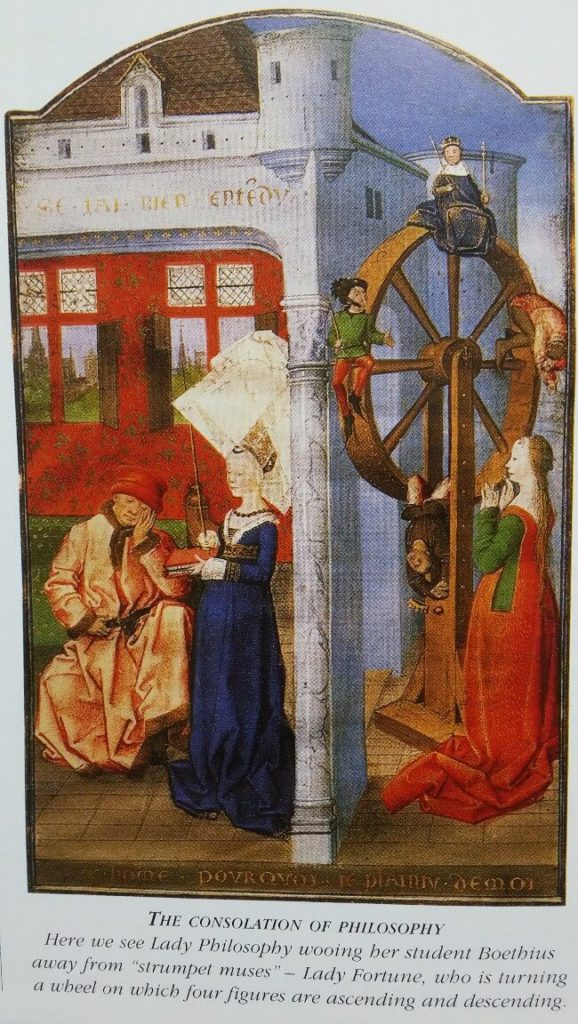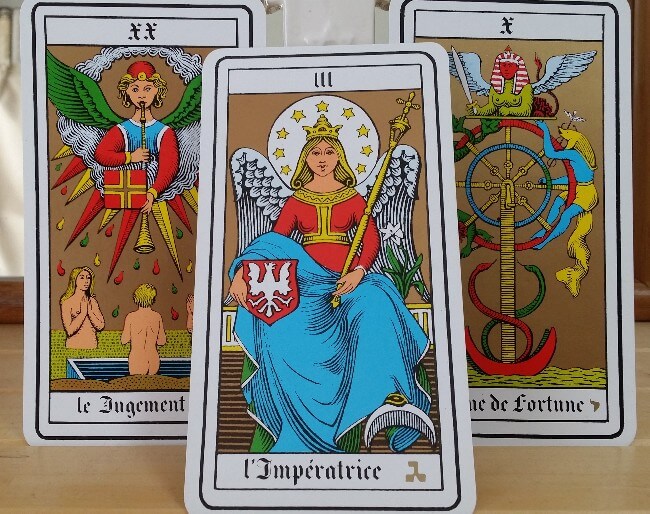The collect for today refers to “the sundry and manifold changes of the world.” The world of changes is the realm of the unreliable goddess Fortuna, the first daughter of Jupiter, of whose whiles we are warned and strengthened against by the philosophical idealism of Boethius in his Consolation of Philosophy and the political realism of Machiavelli in The Prince and other works.
It is in Boethius’ Consolation of Philosophy that we see the first image of the (10) Wheel of Fortune, which is the arcana of this the fourth Sunday after Easter.

trains Boethius to see beyond the sundry changes of this world.
Source: The Story of Philosophy by Brian Magee.
The Gospel reading for the fourth Sunday after Easter is from John 16 in which the Comforter is promised, who will be sent from above, that is, from “the Father of lights” as James puts it, whose constancy or divine stillness may be compared to the restlessness of Fortuna; it is by focusing – “staying our minds” – on the still point of the turning world, that is, on that place where the Comforter breaks in, yet has always been manifesting either as the Son or as the Holy Ghost, that we will find that peace that passeth all understanding. The verse from T. S. Eliot’s poem, Burnt Norton in the Four Quartets springs to mind:
At the still point of the turning world. Neither flesh nor fleshless;
T. S. Eliot, Burnt Norton
Neither from nor towards; at the still point, there the dance is,
But neither arrest nor movement. And do not call it fixity,
Where past and future are gathered. Neither movement from nor towards,
Neither ascent nor decline. Except for the point, the still point,
There would be no dance, and there is only the dance.
I can only say, there we have been: but I cannot say where.
And I cannot say, how long, for that is to place it in time.
The inner freedom from the practical desire,
The release from action and suffering, release from the inner
And the outer compulsion, yet surrounded
By a grace of sense, a white light still and moving,
Erhebung without motion, concentration
Without elimination, both a new world
And the old made explicit, understood
In the completion of its partial ecstasy,
The resolution of its partial horror.
Yet the enchainment of past and future
Woven in the weakness of the changing body,
Protects mankind from heaven and damnation
Which flesh cannot endure.

The Collect
O ALMIGHTY God, who alone canst order the unruly wills and affections of sinful men; Grant unto thy people, that they may love the thing which thou commandest, and desire that which thou dost promise; that so, among the sundry and manifold changes of the world, our hearts may surely there be fixed, where true joys are to be found; through Jesus Christ our Lord. Amen.
Book of Common Prayer
Old Testament Reading
Thou wilt keep him in perfect peace, whose mind is stayed on thee: because he trusteth in thee.
Isaiah 26: 3
New Testament Reading
EVERY good gift and every perfect gift is from above, and cometh down from the Father of lights, with whom is no variableness, neither shadow of turning.
James 1: 17
Liturgical Affirmation
Canet tuba, et mortui resurgent incorrupti.
Tempus casumque in omnibus sunt sub sole.
The trumpet shall sound, and the dead shall rise again incorruptible. Time and chance is in all things under the sun.


